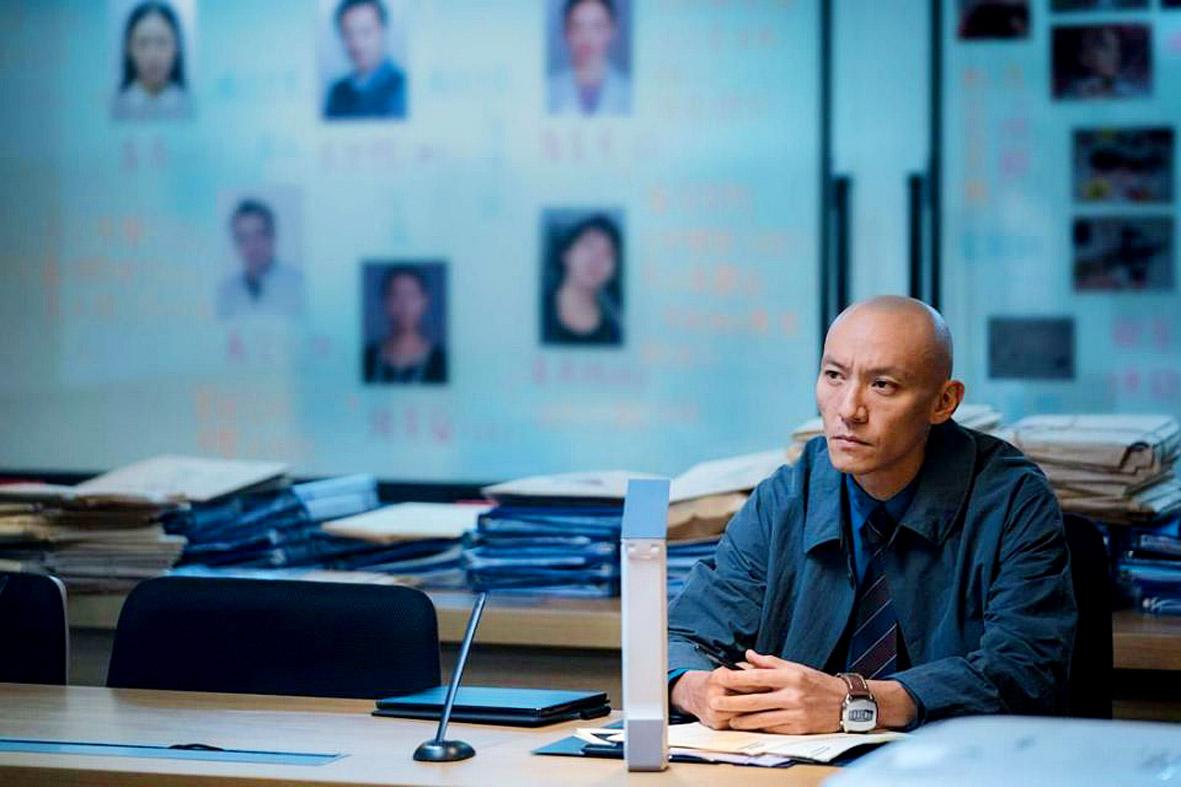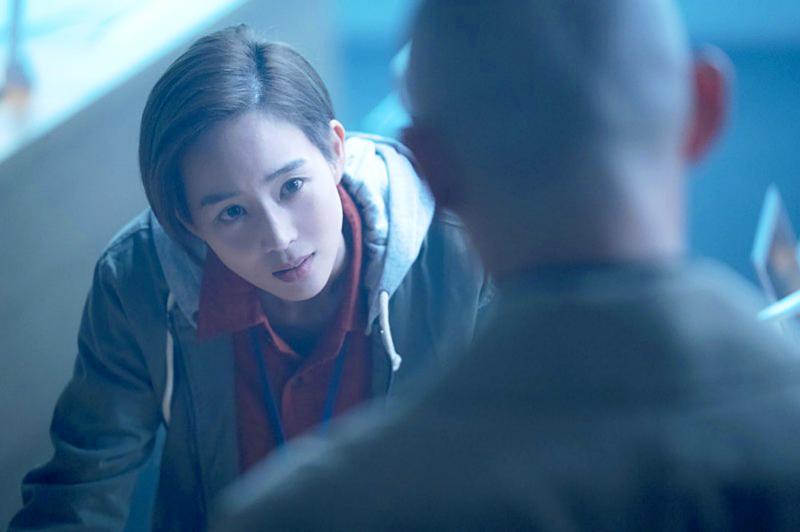With twist after twist and suspenseful, nuanced storytelling, The Soul (緝魂) makes full use of its 130 minute running time. Whenever things seem to be wrapping up, there’s always something else in store — all the way up to the very last scene, but in a way that makes sense and isn’t too confusing.
Helmed by The Tag-Along (紅衣小女孩) series director Cheng Wei-hao (程偉豪), this mystery thriller has his fingerprints all over it with similarly subdued cold tones and Taoist-based supernatural elements. Set in 2031 Taipei, however, this film adds futuristic, sci-fi components to the mix to create a grim yet technologically-advanced cityscape devoid of warmth. It feels slightly dystopian, and the fact that the audience barely gets to see this world outside of the police station, hospital, criminal court and crime scenes, only adds to this unsettling atmosphere.
Gone are the jump scares and spine-tingling moments; instead the film moves at a deliberately moderate pace, just slow enough for each detail to sink in before the next surprise. This isn’t horror. The Soul is purely focused on unraveling the mystery behind the murder of business mogul Wang Shih-tsung (Samuel Ku, 古斌), who is found murdered in the opening scene with a cursed Taoist-based method that would send his soul to eternal hell. All signs point to his mentally unstable son (Erek Lin, 林暉閔), who harbors a deep grudge against his father for neglecting his mother, but other suspicious characters close to Wang suggest that there’s something much deeper and sinister.

Photo courtesy of Vie Vision Pictures
An emaciated, frail Chang Chen (張震), who shed 24kg within three months for the role, enters the fray as the city’s top prosecutor, A-Chao. Despite being stricken with cancer, he spends the whole film getting to the convoluted bottom of what really happened as his health deteriorates. Chang’s harsh appearance and mannerisms fit perfectly with the bleak tones of the film, and his sublime acting really brings his complex character to life and serves as the engine that propels the movie.
A-Chao’s pregnant wife A-Bao (Janine Chang, 張鈞甯) also pulls her punches (literally), not just as a prominent member of the city’s criminal investigative unit but also as a loving partner who brings out the softer side of A-Chao that nobody else sees. The two mesh well together on screen as both lovers and coworkers, giving some tenderness to this uninviting city.
As they try to unravel the tangled web between Wang (who was also dying from cancer), his son, his ex-wife (Zhang Baijia, 張柏嘉), his current wife Li Yan (Sun Anke, 孫安可) and the corporation’s top scientist Dr Wan (Christopher Lee, 李銘順), things keep getting stranger and more intriguing, keeping the audience engaged throughout.

Photo courtesy of Vie Vision Pictures
While all have their acting chops down, Sun’s performance is especially layered and commendable.
There’s too much going in the plot to go into more without further spoiling it, but ultimately, the story is still about the humanity and relationships that drive the characters’ decisions. How far would one go for someone they love? This is the unifying theme that no character gets to avoid in this movie, no matter which side they’re on, and a decision they have to make for themselves.
And that’s what makes the movie so powerful. As each layer of the mystery is peeled off, it’s not just the criminal details that are revealed, but also aspects of the characters that they spend the entire movie trying to hide.
That’s all that really can be said. Just go watch the movie, it’s worth your time.

The 2018 nine-in-one local elections were a wild ride that no one saw coming. Entering that year, the Chinese Nationalist Party (KMT) was demoralized and in disarray — and fearing an existential crisis. By the end of the year, the party was riding high and swept most of the country in a landslide, including toppling the Democratic Progressive Party (DPP) in their Kaohsiung stronghold. Could something like that happen again on the DPP side in this year’s nine-in-one elections? The short answer is not exactly; the conditions were very specific. However, it does illustrate how swiftly every assumption early in an

Towering high above Taiwan’s capital city at 508 meters, Taipei 101 dominates the skyline. The earthquake-proof skyscraper of steel and glass has captured the imagination of professional rock climber Alex Honnold for more than a decade. Tomorrow morning, he will climb it in his signature free solo style — without ropes or protective equipment. And Netflix will broadcast it — live. The event’s announcement has drawn both excitement and trepidation, as well as some concerns over the ethical implications of attempting such a high-risk endeavor on live broadcast. Many have questioned Honnold’s desire to continues his free-solo climbs now that he’s a

Francis William White, an Englishman who late in the 1860s served as Commissioner of the Imperial Customs Service in Tainan, published the tale of a jaunt he took one winter in 1868: A visit to the interior of south Formosa (1870). White’s journey took him into the mountains, where he mused on the difficult terrain and the ease with which his little group could be ambushed in the crags and dense vegetation. At one point he stays at the house of a local near a stream on the border of indigenous territory: “Their matchlocks, which were kept in excellent order,

Jan. 19 to Jan. 25 In 1933, an all-star team of musicians and lyricists began shaping a new sound. The person who brought them together was Chen Chun-yu (陳君玉), head of Columbia Records’ arts department. Tasked with creating Taiwanese “pop music,” they released hit after hit that year, with Chen contributing lyrics to several of the songs himself. Many figures from that group, including composer Teng Yu-hsien (鄧雨賢), vocalist Chun-chun (純純, Sun-sun in Taiwanese) and lyricist Lee Lin-chiu (李臨秋) remain well-known today, particularly for the famous classic Longing for the Spring Breeze (望春風). Chen, however, is not a name